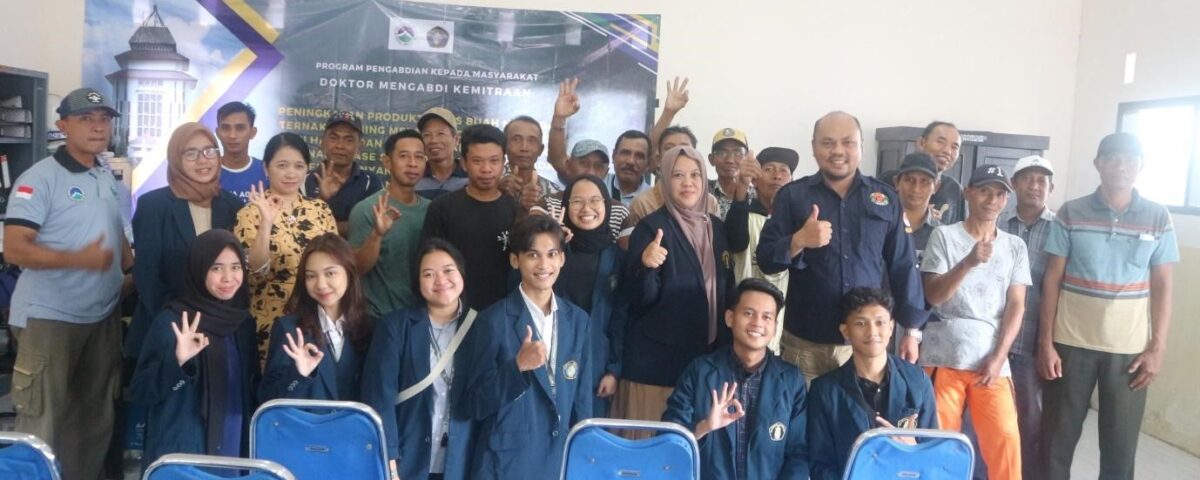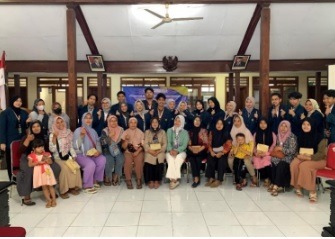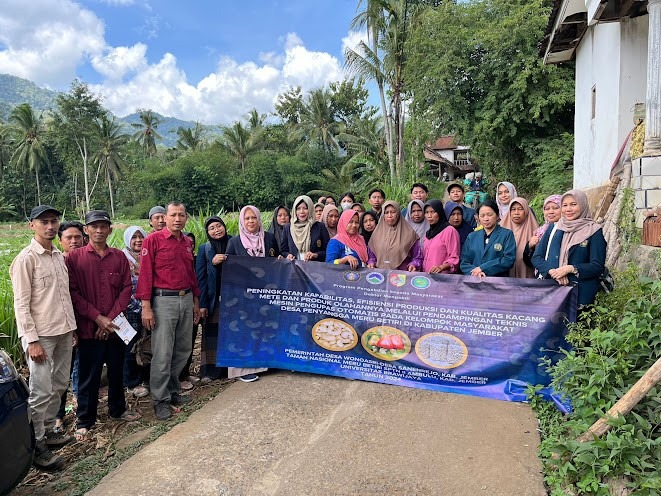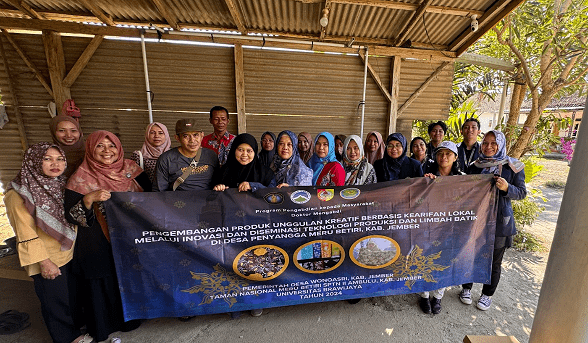Innovative Solutions to Increase Dragon Fruit Productivity with Biological Agents

Thanks to Green Chili Pepper, FTP student becomes the youngest UB graduate
August 10, 2023
FTP lecturer fostering Oyster Mushroom Farmers in Jember
August 11, 2023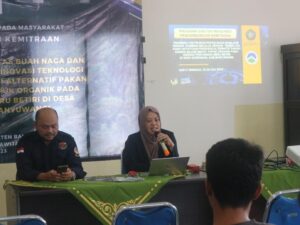 One of the tourist villages that have the potential to be a dragon fruit producing village is Sarongan village located in Banyuwangi Regency which is one of the buffer areas of Meru betiri National Park. In Sarongan village, dragon fruit commodity developed there is a problem that is dragon fruit tree productivity decreased in the last 2 years during the off-season. So far, dragon fruit farmers still use the lamp method with costs reaching Rp8, 000, 000 per hectare for 15 days. Dragon fruit farmers also still use chemical fertilizers to maintain the stability of dragon fruit productivity at a cost of rp15, 000, 000 per year. This method cannot be applied by all dragon fruit farmers because electricity costs are too expensive and chemical fertilizers used are still not efficient in overcoming smallpox.
One of the tourist villages that have the potential to be a dragon fruit producing village is Sarongan village located in Banyuwangi Regency which is one of the buffer areas of Meru betiri National Park. In Sarongan village, dragon fruit commodity developed there is a problem that is dragon fruit tree productivity decreased in the last 2 years during the off-season. So far, dragon fruit farmers still use the lamp method with costs reaching Rp8, 000, 000 per hectare for 15 days. Dragon fruit farmers also still use chemical fertilizers to maintain the stability of dragon fruit productivity at a cost of rp15, 000, 000 per year. This method cannot be applied by all dragon fruit farmers because electricity costs are too expensive and chemical fertilizers used are still not efficient in overcoming smallpox.
One solution to the problem through the innovation of biological agents production. Biological control seeks ways to control diseases that involve manipulating favorable natural enemies to obtain a reduction in pests and diseases present in plants. The doctoral team serving the partnership collaborated with thematic real work college students from the Agricultural Industry Technology Study Program, namely Tsana Aulia Putri Budiman, Arya Maulana, Hanifah Nuradiningtias, and Reka Cahyo Anggoro who carried out technical guidance and assistance in biological agent production technology to overcome problems that occurred in the Sarongan Village community on July 15, 2023 in Sarongan Village, Pesanggaran District, Banyuwangi Regency.
Technical guidance activities carried out to provide knowledge and skills to farmers from members of the Betiri farmer Partner Group who are assisted by BTNMB SPTN II Banyuwangi. Implementation of technical guidance activities by Dr. Siti Asmaul Mustaniroh, STP, MP from the Faculty of Agricultural Technology as the head of the doctoral team served in partnership with her team Frelyta Ainuz Zahro, S.P., M.P. from the Faculty of Agriculture, M.Sc, as well as accompanying staff from the Tnmb Hall, Wahyu Candra Kirana, S.Hut.
Innovation of biological agent production technology using Trichoderma, Azotobacter, Beauveria bassiana, and Pseudomonas fuorescens bacteria. Production of biological agents can be done in 2 ways, namely with solid media and liquid media. The main ingredient of making solid media is using broken corn and using Trichoderma isolates as agents to be propagated. While the main ingredients in the manufacture of liquid media can use potato extract and soybean extract. Liquid Media from potato extract using Trichoderma isolates that are beneficial to inhibit the growth and spread of fungal toxins that cause disease for plants and Beauveria bassiana isolates that are beneficial to control insect pests that are above the ground and to prevent the development of brown stem planthopper pests, walang sangit, bedbugs, green Javelins, aphids. While the liquid media of soybean extract using azotobacter isolates are beneficial to increase fertility in plants and Pseudomonas fluorescens are beneficial to produce growth regulators that can increase plant growth and production. Azotobacter and Pseudomonas fluorescens isolates are often used as PGPR (Plant Growth Promoting Rhizobacteria) and also as biological agents in plant diseases.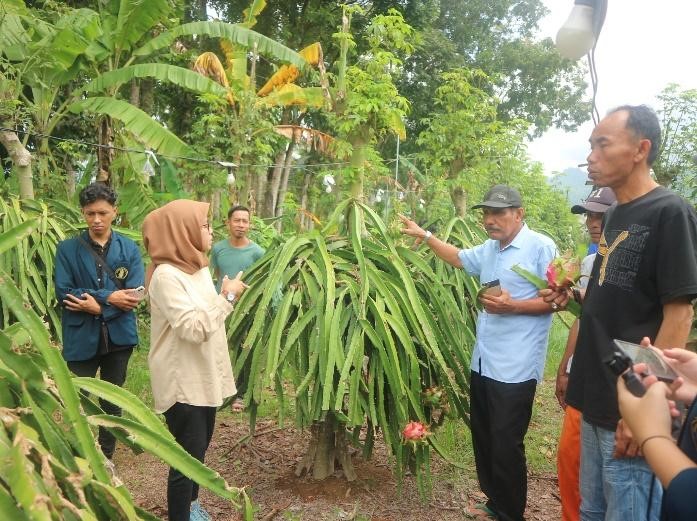
The activity continued with the practice of making biological agents of solid media and liquid media at the House of the chairman of Mitra Tani Betiri and continued with a survey of dragon fruit land conditions affected by smallpox. During the manufacturing process, students take a direct role in the preparation of tools and materials, the assembly of fermenter tools, the manufacture of biological agent media to the biological agent fermentation monitoring process which is carried out for 7 days.
The success indicator of fermentation of biological agents in liquid media is when the solution starts to taste sour fermentation, while the success indicator in solid media is when the media starts to change color to greenish.
The follow-up of the success of the production of biological agents is carried out laboratory testing at the Faculty of Agriculture, Universitas Brawijaya. It is hoped that the results of the dissemination of biological agent production will be an innovative alternative solution to increase the productivity of dragon fruit cultivation so that it can increase harvest capacity during the off-season and can increase the income of dragon fruit farmers. In addition, it is expected that the dissemination of biological agents production can reduce the cost of electricity for lights and the cost of shopping for chemical fertilizers issued by dragon fruit farmers.
- Category in:
- News

